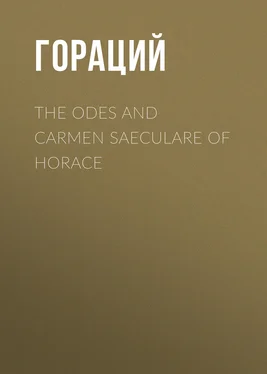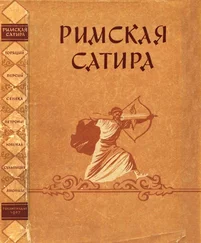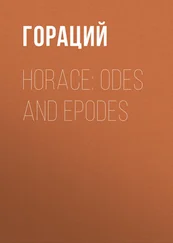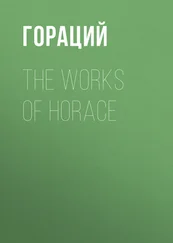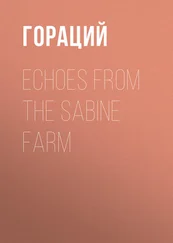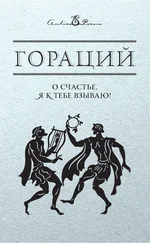Квинт Гораций Флакк - The Odes and Carmen Saeculare of Horace
Здесь есть возможность читать онлайн «Квинт Гораций Флакк - The Odes and Carmen Saeculare of Horace» — ознакомительный отрывок электронной книги совершенно бесплатно, а после прочтения отрывка купить полную версию. В некоторых случаях можно слушать аудио, скачать через торрент в формате fb2 и присутствует краткое содержание. Жанр: foreign_poetry, Поэзия, foreign_antique, foreign_prose, на английском языке. Описание произведения, (предисловие) а так же отзывы посетителей доступны на портале библиотеки ЛибКат.
- Название:The Odes and Carmen Saeculare of Horace
- Автор:
- Жанр:
- Год:неизвестен
- ISBN:нет данных
- Рейтинг книги:4 / 5. Голосов: 1
-
Избранное:Добавить в избранное
- Отзывы:
-
Ваша оценка:
- 80
- 1
- 2
- 3
- 4
- 5
The Odes and Carmen Saeculare of Horace: краткое содержание, описание и аннотация
Предлагаем к чтению аннотацию, описание, краткое содержание или предисловие (зависит от того, что написал сам автор книги «The Odes and Carmen Saeculare of Horace»). Если вы не нашли необходимую информацию о книге — напишите в комментариях, мы постараемся отыскать её.
The Odes and Carmen Saeculare of Horace — читать онлайн ознакомительный отрывок
Ниже представлен текст книги, разбитый по страницам. Система сохранения места последней прочитанной страницы, позволяет с удобством читать онлайн бесплатно книгу «The Odes and Carmen Saeculare of Horace», без необходимости каждый раз заново искать на чём Вы остановились. Поставьте закладку, и сможете в любой момент перейти на страницу, на которой закончили чтение.
Интервал:
Закладка:
Horace
The Odes and Carmen Saeculare of Horace
PREFACE
I scarcely know what excuse I can offer for making public this attempt to "translate the untranslatable." No one can be more convinced than I am that a really successful translator must be himself an original poet; and where the author translated happens to be one whose special characteristic is incommunicable grace of expression, the demand on the translator's powers would seem to be indefinitely increased. Yet the time appears to be gone by when men of great original gifts could find satisfaction in reproducing the thoughts and words of others; and the work, if done at all, must now be done by writers of inferior pretension. Among these, however, there are still degrees; and the experience which I have gained since I first adventured as a poetical translator has made me doubt whether I may not be ill-advised in resuming the experiment under any circumstances. Still, an experiment of this kind may have an advantage of its own, even when it is unsuccessful; it may serve as a piece of embodied criticism, showing what the experimenter conceived to be the conditions of success, and may thus, to borrow Horace's own metaphor of the whetstone, impart to others a quality which it is itself without. Perhaps I may be allowed, for a few moments, to combine precept with example, and imitate my distinguished friend and colleague, Professor Arnold, in offering some counsels to the future translator of Horace's Odes, referring, at the same time, by way of illustration, to my own attempt.
The first thing at which, as it seems to me, a Horatian translator ought to aim, is some kind of metrical conformity to his original. Without this we are in danger of losing not only the metrical, but the general effect of the Latin; we express ourselves in a different compass, and the character of the expression is altered accordingly. For instance, one of Horace's leading features is his occasional sententiousness. It is this, perhaps more than anything else, that has made him a storehouse of quotations. He condenses a general truth in a few words, and thus makes his wisdom portable. "Non, si male nunc, et olim sic erit;" "Nihil est ab omni parte beatum;" "Omnes eodem cogimur,"—these and similar expressions remain in the memory when other features of Horace's style, equally characteristic, but less obvious, are forgotten. It is almost impossible for a translator to do justice to this sententious brevity unless the stanza in which he writes is in some sort analogous to the metre of Horace. If he chooses a longer and more diffuse measure, he will be apt to spoil the proverb by expansion; not to mention that much will often depend on the very position of the sentence in the stanza. Perhaps, in order to preserve these external peculiarities, it may be necessary to recast the expression, to substitute, in fact, one form of proverb for another; but this is far preferable to retaining the words in a diluted form, and so losing what gives them their character, I cannot doubt, then, that it is necessary in translating an Ode of Horace to choose some analogous metre; as little can I doubt that a translator of the Odes should appropriate to each Ode some particular metre as its own. It may be true that Horace himself does not invariably suit his metre to his subject; the solemn Alcaic is used for a poem in dispraise of serious thought and praise of wine; the Asclepiad stanza in which Quintilius is lamented is employed to describe the loves of Maecenas and Licymnia. But though this consideration may influence us in our choice of an English metre, it is no reason for not adhering to the one which we may have chosen. If we translate an Alcaic and a Sapphic Ode into the same English measure, because the feeling in both appears to be the same, we are sure to sacrifice some important characteristic of the original in the case of one or the other, perhaps of both. It is better to try to make an English metre more flexible than to use two different English metres to represent two different aspects of one measure in Latin. I am sorry to say that I have myself deviated from this rule occasionally, under circumstances which I shall soon have to explain; but though I may perhaps succeed in showing that my offences have not been serious, I believe the rule itself to be one of universal application, always honoured in the observance, if not always equally dishonoured in the breach.
The question, what metres should be selected, is of course one of very great difficulty. I can only explain what my own practice has been, with some of the reasons which have influenced me in particular cases. Perhaps we may take Milton's celebrated translation of the Ode to Pyrrha as a starting point. There can be no doubt that to an English reader the metre chosen does give much of the effect of the original; yet the resemblance depends rather on the length of the respective lines than on any similarity in the cadences. But it is evident that he chose the iambic movement as the ordinary movement of English poetry; and it is evident, I think, that in translating Horace we shall be right in doing the same, as a general rule. Anapaestic and other rhythms may be beautiful and appropriate in themselves, but they cannot be manipulated so easily; the stanzas with which they are associated bear no resemblance, as stanzas, to the stanzas of Horace's Odes. I have then followed Milton in appropriating the measure in question to the Latin metre, technically called the fourth Asclepiad, at the same time that I have substituted rhyme for blank verse, believing rhyme to be an inferior artist's only chance of giving pleasure. There still remains a question about the distribution of the rhymes, which here, as in most other cases, I have chosen to make alternate. Successive rhymes have their advantages, but they do not give the effect of interlinking, which is so natural in a stanza; the quatrain is reduced to two couplets, and its unity is gone. From the fourth to the third Asclepiad the step is easy. Taking an English iambic line of ten syllables to represent the longer lines of the Latin, an English iambic line of six syllables to represent the shorter, we see that the metre of Horace's "Scriberis Vario" finds its representative in the metre of Mr. Tennyson's "Dream of Fair Women." My experience would lead me to believe the English metre to be quite capable, in really skilful hands, of preserving the effect of the Latin, though, as I have said above, the Latin measure is employed by Horace both for a threnody and for a love-song.
The Sapphic and the Alcaic involve more difficult questions. Here, however, as in the Asclepiad, I believe we must be guided, to some extent, by external similarity. We must choose the iambic movement as being most congenial to English; we must avoid the ten-syllable iambic as already appropriated to the longer Asclepiad line. This leads me to conclude that the staple of each stanza should be the eight-syllable iambic, a measure more familiar to English lyric poetry than any other, and as such well adapted to represent the most familiar lyric measures of Horace. With regard to the Sapphic, it seems desirable that it should be represented by a measure of which the three first lines are eight-syllable iambics, the fourth some shorter variety. Of this stanza there are at least two kinds for which something might be said. It might be constructed so that the three first lines should rhyme with each other, the fourth being otherwise dealt with; or it might be framed on the plan of alternate rhymes, the fourth line still being shorter than the rest. Of the former kind two or three specimens are to be found in Francis' translation of Horace. In these the fourth line consists of but three syllables, the two last of which rhyme with the two last syllables of the fourth line of the next succeeding stanza, as for instance:—
Читать дальшеИнтервал:
Закладка:
Похожие книги на «The Odes and Carmen Saeculare of Horace»
Представляем Вашему вниманию похожие книги на «The Odes and Carmen Saeculare of Horace» списком для выбора. Мы отобрали схожую по названию и смыслу литературу в надежде предоставить читателям больше вариантов отыскать новые, интересные, ещё непрочитанные произведения.
Обсуждение, отзывы о книге «The Odes and Carmen Saeculare of Horace» и просто собственные мнения читателей. Оставьте ваши комментарии, напишите, что Вы думаете о произведении, его смысле или главных героях. Укажите что конкретно понравилось, а что нет, и почему Вы так считаете.
